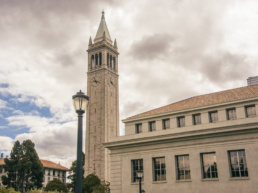Luísa Magalhães is the winner of the 3rd edition of the FLAD Science Award Atlantic. The researcher at CESAM – Center for Environmental and Sea Studies and the Department of Biology, University of Aveiro, will receive 300,000 euros of funding in three years to develop a project linked to parasitic diseases in coastal marine ecosystems and their impacts, namely ecological, economic and social.
The Jury considered the project UNTIE – UNravelling the role of emerging parasitic diseases in the structure and function of coastal communiTIEs and ecosystems – very relevant from a scientific point of view, and with great interest to Portugal since some of the organisms to be studied (molluscs, bivalves) represent one of the main export sectors, and praised the quality of the American partnership, established with the Smithsonian Environmental Research Center of the Smithsonian Institution.
The project that will be developed by Luísa Magalhães will focus on the impact of the parasites trematodes that infect marine invertebrates, especially bivalves of high ecological and economic importance, using experiments in two parts of the Atlantic: Chesapeake Bay in Maryland, USA; and the Ria de Aveiro in Portugal.
“Trematodes are often considered of low pathogenicity and therefore even less studied than other classes of parasites. However, they are one of the most prevalent parasites and depending on the species, the intensity of the infection and the interaction of the parasite with the vital organs of the host, an trematode can be extremely pernicious with known effects on reproduction, growth and survival.” – Luísa Magalhães.
Despite the high percentage of biodiversity that is composed of parasites (estimates of about 40%), and potentially all living beings without exception are, have been, or become infected by some parasite at some point in their life, there are still not enough studies to help to know the implications of the infection.
“The low pathogenicity of these parasites is often referred to because in fact the effects, when they exist, are often sublethal and not very evident. This will be the main reason for being little studied. However, due to the high prevalence – % of infected hosts – and omnipresence, especially in the marine environment, it is very important to realize that factors can lead to sudden increases in infection and in what scenario these increases can have impacts on the community and ecosystem. Only with this knowledge will it be possible to predict and protect.” – Luísa Magalhães.
With the FLAD Science Award Atlantic, Luísa Magalhães will now start research to bridge this gap and understand how the loss and/or gain of parasite diversity in a community can cascade effects on the productivity and stability of ecosystems in ways that until now are considered unpredictable.
The knowledge generated will help to make more efficient management of the habitats most vulnerable to trematode infection so that disease episodes can be predicted or at least mitigated without jeopardising ecosystem stability and the production of resources with commercial (and/or ecological) value.
About the Award
The study of the Atlantic is fundamental to understand very diverse and multidisciplinary areas with an impact on the sustainability of the planet and on our quality of life, from the interaction between the oceans, the atmosphere and space, to climate change, natural phenomena and sustainability.
FLAD’s goal is to stimulate the development of technology and promote the new generation of Portuguese scientists. This award has a great focus on achieving practical results, such as the creation of engineering and technologies, that facilitate our understanding and exploration of Atlantic ecosystems.
FLAD also intends to provide support and distinguish researchers at the beginning of their careers, thus promoting the new and promising generation of researchers residing in Portugal, always with a close collaboration link with the main research groups in the USA.
Jury
The evaluation of the applications was made by a jury of excellence composed of four elements. The scientific committee, which is part of that same jury, consists of:
- Elsa Henriques, member of the Executive Board of the Luso-American Foundation for Development and Professor of the Instituto Superior Técnico;
- Miguel Miranda, Professor at the Faculty of Sciences, University of Lisbon, and President of IPMA. Specialist in Geomagnetism, Marine Geophysics, and Natural Risks, with a special focus on Tsunamis;
- Pedro Camanho, Professor at the Faculty of Engineering, University of Porto, president of LAETA and guest scientist at NASA. Specialist in Composite Materials and in the development of computational models for the design of Aerospace systems.
- Rui Ferreira dos Santos, Professor at CENSE – Center for Research in Environment and Sustainability, Faculty of Science and Technology, NOVA University of Lisbon
Related Posts
November 17, 2025
Projects Selected for the UP Program – Higher Education 2026
FLAD allocates €30,000 per project to…
November 5, 2025
Speaking Portuguese has become an advantage for Portuguese descendants in the U.S.
A new study on Portuguese-American…


